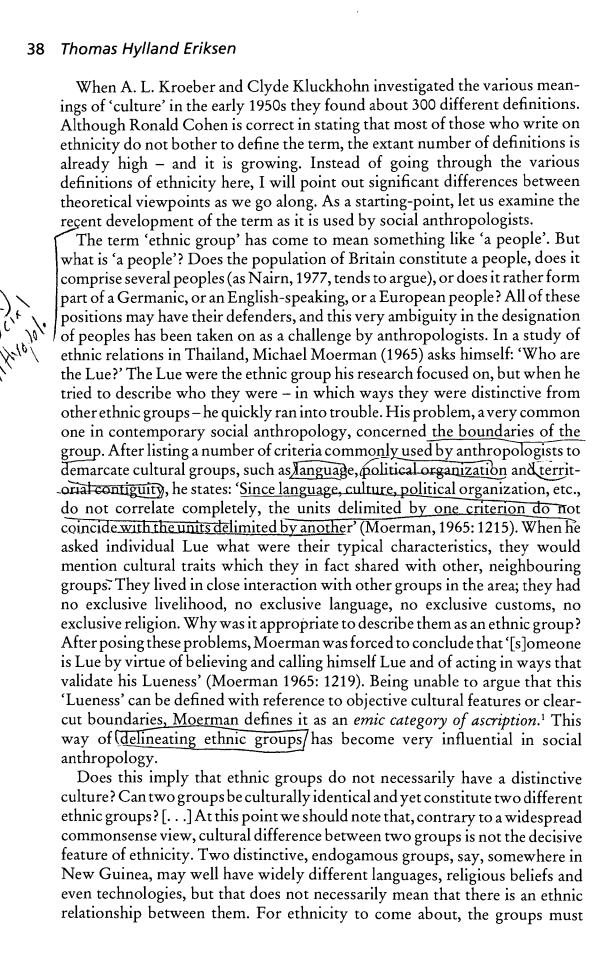
The Ethnicity Reader Nationalism, Multiculturalism and Migration (Montserrat Guibernau John Rex)
.pdf








Ethnicity, race and nation
but they are not one and the same thing and must be distinguished from one another analytically.
[• • •]
FROM TRIBE TO ETHNIC GROUP
37
There
has
been
a
shift
in
Anglophone
social
anthropological
terminology
concerning of ‘tribes’,
the the
nature of the social units we study. While one formerly spoke |
|
term ‘ethnic group |
is nowadays much more common. This |
’ |
|
switch in terminology implies more than a mere replacement of one word with |
|||
another. |
Notably, the use of the term ‘ethnic group’ suggests contact and |
||
interrelationship. To speak of an ethnic group in total isolation is as absurd as |
|||
to speak of the sound from one hand clapping. By definition, ethnic groups |
|||
remain more.orJ.ess discrete, but they are aware of |
~ |
|
|
T |
and m contacTwith - |
||
- |
r ethnic groups. Moreover, these groups or categonesare in |
||
membe |
|||
a
sense
created
through
that
very
contact
.
Gr
#
up
identities
must
always
be
defined
in
relation
to
that
which
they
are
not
-
in
other
words,
in
relation
to
non
-
members
of
the
group
.
The terminological switchfrom tribe’ to ethnic group’may also mitigate or |
|||||||
|
|
|
|
‘ |
|
‘ |
|
even transcend an ethnocentricor Eurocentric bias which anthropologists have |
|||||||
often |
^ |
|
|
|
|
|
|
en accusecLofipromoting covertly. When we talk of tribes, we impli- |
|||||||
|
|
- |
^ |
|
|
|
|
citly |
introduce a |
sharp7 |
fuaIitafiV |
~ |
ourselves and the |
||
|
5 disfihction between |
||||||
people we study; |
the distinction |
generally corresponds |
to the distinction |
||||
between modern and traditional or so-called primitive societies. If we instead |
|||||||
. yh
talk
of
ethnic
groups
or
categories
,
such
a
sharp
distinction
becomes
difficult
to he
maintain. Virtually every or she lives in Europe,
human being
Melanesia or
belongs Central
to an ethnic group |
whether |
, |
|
America. There are ethnic |
|
groups iiTEnglish cities, in the Bolivian highlands. Anthropologists themselves
countryside and belong to ethnic
in the New
groups or
Guinea nations.
Moreover
,
the
concepts
and
models
used
in
the
study
of
ethnicity
can
often
be
applied to modern Western societies.
as In
well as non-modern contexts, to Western as well as non-
this sense, the concept of ethnicity can be said to bridge
two important gapsinsocial than statics,and it relativizes
moderns and tribals.
anthropology:it entails a focus on dynamics |
rather |
||||||||
the boundaries between‘Us and Them |
|
||||||||
|
|
|
^- |
’ |
|
‘ |
|
’, between |
|
|
|
<er |
c |
C \ |
f / |
' |
pUiocf |
||
UA |
|
5 |
|||||||
|
|
|
|
|
|
|
|
||
|
|
|
|
|
|
|
|
|
|
' |
< f A 1 |
\ 0 <o |
, |
|
|
|
|
|
|
P |
|
|
|
|
|
|
|||
|
V |
|
|
|
|
|
|
|
|
|
' |
|
|
|
|
|
|
|
|
WHAT
IS
ETHNICITY
?
When we in mutual
talk of ethnicity, we indicate that groups and identities contact rather than in isolation. But what is the nature
have developed of such groups?

